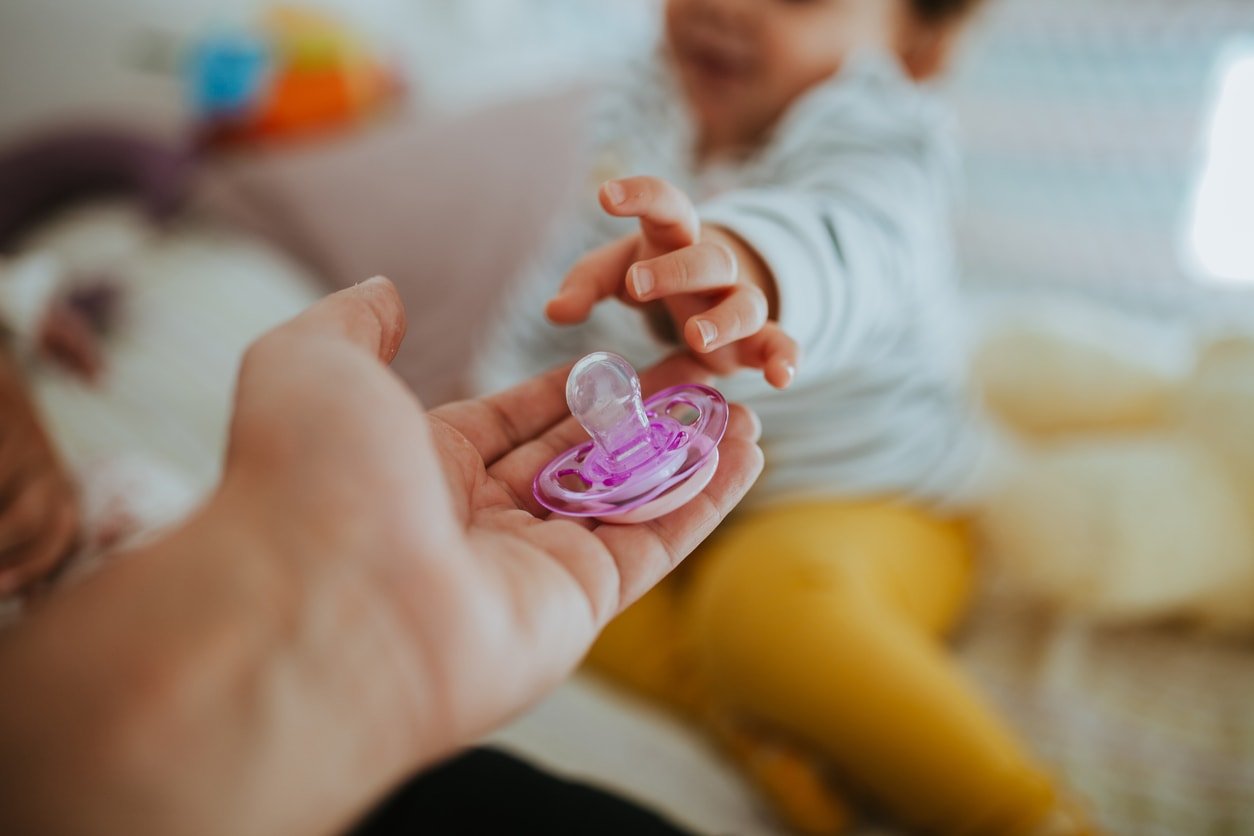Thumb-sucking is a natural behavior for infants and young children. Studies show that approximately 90% of newborns exhibit some form of sucking reflex or hand sucking within two hours after birth.1 You may have even looked on in delight during an ultrasound visit or two before your little one made his debut as you witnessed him sucking his tiny thumb in utero to comfort himself.
It’s truly remarkable to think about our innate ability to self-soothe, even before birth. But as time goes on and your child grows older, that cute habit can cause concern. Parents of thumb suckers worry about every implication, from damage to teeth to possible infections and even teasing from other children. Let’s delve into the world of thumb-sucking, examining its benefits, drawbacks, alternative options, and everything in between.
Pros of Thumb-Sucking
So, is thumb-sucking bad? Thumb sucking is considered normal behavior in infants and young children and should not pose any permanent issues if it ceases by the age of 5. Usually, the positive aspects of thumb sucking are not widely discussed. However, one study says that there may be benefits to having your fingers in your mouth.2
Researchers in New Zealand followed about 1,000 people born in 1972-1973 until their 38th birthday. When they were 5, 7, 9, and 11, the researchers asked their parents if they sucked their thumbs or bit their nails. When they tested at 13 for allergies to common things such as dust, grass, cats, dogs, and molds, they found that 38% of those who had an “oral habit” tested positive — whereas 49% of those who didn’t suck their thumbs or bite their nails tested positive. This “protection” was still there at age 32.2
Thumb-Sucking Cons
Many children naturally stop thumb-sucking between the ages of two and four. Parents need not be concerned until the eruption or breaking through of the front teeth. Potential problems such as bite issues or protruding front teeth may arise at this stage.1
Prolonged thumb sucking may cause problems with the proper growth of the mouth and the alignment of teeth. It can also cause changes in the roof of the mouth.3 If the bite does not correct itself and the upper adult teeth are sticking out, orthodontic treatment may be needed to realign the teeth and help prevent broken front teeth.4
The intensity of thumb sucking plays a role in determining whether such issues might develop. Other possible problems resulting from thumb sucking include sore thumbs, infections, and calluses.1
Pacifier Pros

Using pacifiers is harmless for babies and infants and can offer great benefits. They have been found to have analgesic effects, which means they can help soothe and comfort little ones during stressful scenarios. Pacifiers can make the end of a feeding, a new environment, or even a minor medical procedure like routine shots more bearable. For preterm infants, using pacifiers has even been shown to lead to shorter hospital stays, which is fantastic news for worried parents.5
Another significant advantage is that pacifiers can reduce the risk of sudden infant death syndrome (SIDS). Offering pacifiers to infants from one month and older at bedtime can be a helpful precautionary measure against SIDS.6
Pacifier Cons
However, as with most things, there are potential downsides to prolonged pacifier use. One concern is that a pacifier could negatively impact breastfeeding, causing difficulties for both the baby and the mother.6 I vividly recall coming home from the hospital with our newborn and hesitating to introduce a pacifier. A lactation consultant’s warning about potential nipple confusion echoed in my mind, and we tried various soothing techniques to calm his cries.
However, after about two weeks, my mom and mother-in-law both urged me to try a pacifier for his comfort. Reluctantly, we gave in, and the result was instant calm for everyone. Plus, my son never experienced any issues with breastfeeding. The American Academy of Family Physicians suggests educating mothers about pacifier use in the immediate postpartum period to avoid breastfeeding issues.6
Consider Dental Health
Dental health is another consideration. Extended use of pacifiers might lead to dental malocclusion, which can affect how the teeth align. Adverse dental effects are more likely to become noticeable after two years, especially when pacifier use continues beyond four years.9
Additionally, there’s a risk of otitis media, an ear infection associated with pacifier use.9 Medical experts recommend weaning children off pacifiers during the second six months of life to prevent this.6
Is Thumb-Sucking or Pacifier Use Less Damaging?
Experts suggest that pacifiers may be preferable to thumb-sucking for several reasons. Pacifiers are softer and cause less damage to the teeth compared to the prolonged pressure of thumb-sucking. Additionally, the plastic rim on pacifiers can alleviate some tension on the teeth. From a hygiene perspective, pacifiers are easy to clean, promoting better oral health than a thumb’s constant presence.1
When it comes to the best pacifier for a thumb sucker, it’s important to remember that there isn’t a one-size-fits-all solution. Every baby is different, and finding the correct pacifier may involve trial and error to see which one your baby prefers.
How To Stop Thumb-Sucking

While one technique to stop this behavior can be simply ignoring it until your child naturally abandons the habit, some methods exist to stop the behavior. If ignoring it isn’t effective, try one of these techniques:
Praise Them for Not Sucking Their Thumb
Encourage positive behavior in your child by offering praise and small rewards for refraining from thumb-sucking. You can start with an hour before bedtime and maybe work up to no thumb-sucking after dinner. Celebrating their accomplishment with stickers on a calendar may motivate them.8
Figure Out What Causes the Behavior
Identifying the underlying issue of why your child is sucking their thumb and offering comfort through alternative means is essential. Instead of thumb-sucking, provide reassurance and comfort with a warm hug or comforting words. Introducing a pillow or stuffed animal can also be a helpful and soothing substitute.8
Be Gentle With Reminders
If your child unconsciously sucks their thumb, kindly offer gentle reminders to stop the habit. Use a compassionate approach to encourage them to discontinue thumb-sucking naturally. By providing understanding and support, you can help your child gradually break the habit in a positive and nurturing manner.8
Overall, thumb-sucking can have pros and cons for children, making it vital for parents to be aware of its impact on their little ones. Understanding that thumb-sucking can serve as a coping mechanism for stress or comfort, parents can be more attuned to their child’s behavior and emotions. Being proactive about monitoring the intensity and duration of thumb sucking can also help address any potential oral health issues early on. Parents can guide their children through this developmental phase and ensure their healthy growth with a caring and supportive approach.































